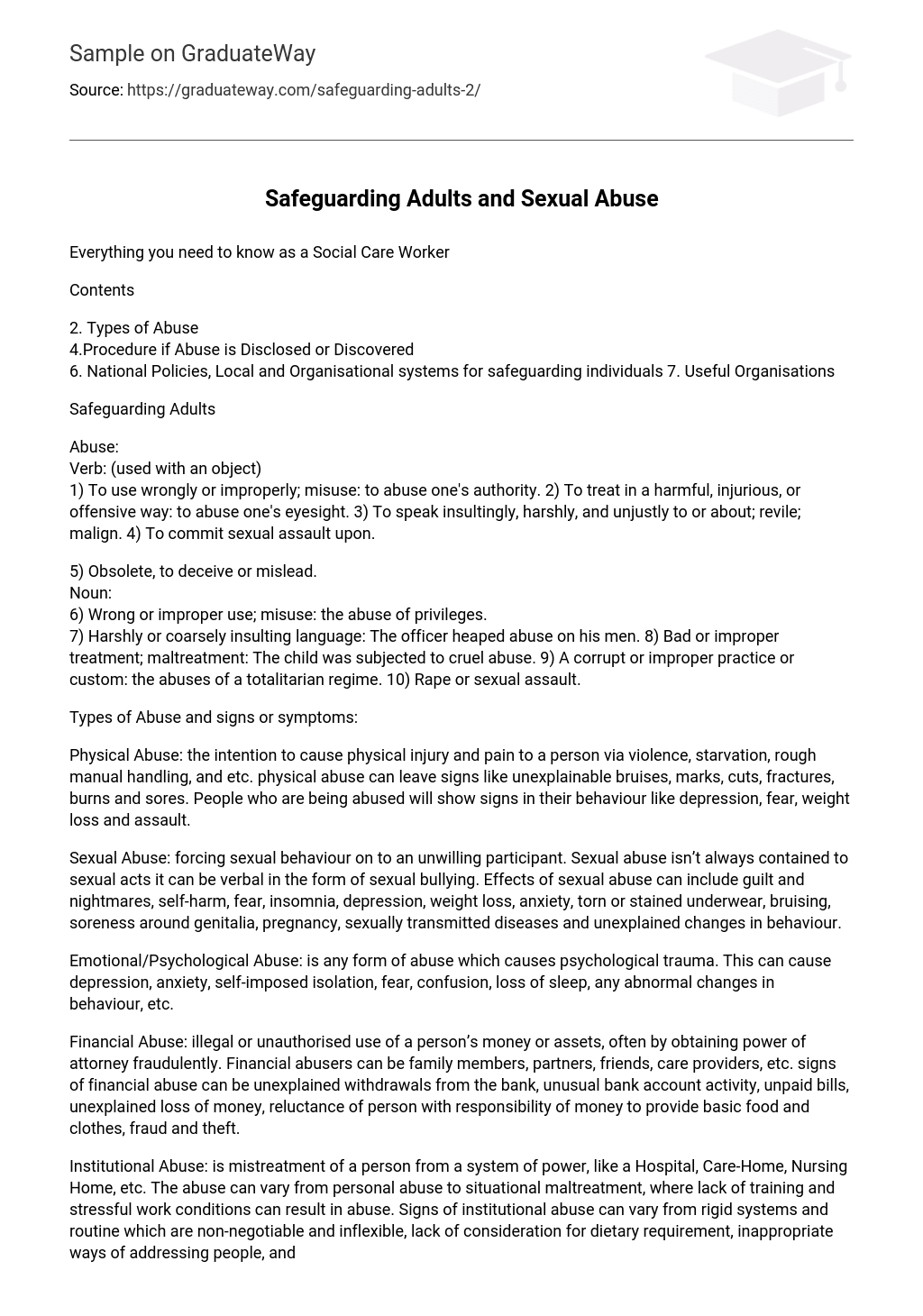Safeguarding Adults
Abuse:
- To use wrongly or improperly; misuse: to abuse one’s authority.
- To treat in a harmful, injurious, or offensive way: to abuse one’s eyesight.
- To speak insultingly, harshly, and unjustly to or about; revile; malign.
- To commit sexual assault upon.
- Obsolete, to deceive or mislead.
Wrong or improper use; misuse: the abuse of privileges.
- Harshly or coarsely insulting language: The officer heaped abuse on his men.
- Bad or improper treatment; maltreatment: The child was subjected to cruel abuse.
- A corrupt or improper practice or custom: the abuses of a totalitarian regime.
Rape or sexual assault
Types of Abuse and signs or symptoms:
- Physical Abuse: the intention to cause physical injury and pain to a person via violence, starvation, rough manual handling, and etc. physical abuse can leave signs like unexplainable bruises, marks, cuts, fractures, burns and sores. People who are being abused will show signs in their behaviour like depression, fear, weight loss and assault.
- Sexual Abuse: forcing sexual behaviour on to an unwilling participant. Sexual abuse isn’t always contained to sexual acts it can be verbal in the form of sexual bullying. Effects of sexual abuse can include guilt and nightmares, self-harm, fear, insomnia, depression, weight loss, anxiety, torn or stained underwear, bruising, soreness around genitalia, pregnancy, sexually transmitted diseases and unexplained changes in behaviour.
- Emotional/Psychological Abuse: is any form of abuse which causes psychological trauma. This can cause depression, anxiety, self-imposed isolation, fear, confusion, loss of sleep, any abnormal changes in behaviour, etc.
- Financial Abuse: illegal or unauthorised use of a person’s money or assets, often by obtaining power of attorney fraudulently. Financial abusers can be family members, partners, friends, care providers, etc. signs of financial abuse can be unexplained withdrawals from the bank, unusual bank account activity, unpaid bills, unexplained loss of money, reluctance of person with responsibility of money to provide basic food and clothes, fraud and theft.
- Institutional Abuse: is mistreatment of a person from a system of power, like a Hospital, Care-Home, Nursing Home, etc. The abuse can vary from personal abuse to situational maltreatment, where lack of training and stressful work conditions can result in abuse. Signs of institutional abuse can vary from rigid systems and routine which are non-negotiable and inflexible, lack of consideration for dietary requirement, inappropriate ways of addressing people, and lack of physical care.
- Self-Neglect: self-destructive behaviour which can vary, these are actions which can be harmful to their mental and physical health. This can include self-harm, poor hygiene, malnourishment, weight loss, under or over medication and inappropriate living standards.
- Neglect by Others: withholding care which is essential to a person’s wellbeing that they are unable to provide for themselves. This can be a range of things from withholding food and medication, bed sores, confusion, untreated medical problems, malnutrition and over sedation. Procedure if abuse is disclosed or discovered
The person being abused disclosing an allegation to you
A colleague, family member or somebody else may tell you something which causes concern. You may notice injuries or physical signs that cause concern. If someone tells you they are being abused then you should stop what you are doing and listen carefully. The conversation should be treated with confidence and only passed on to those who need to know, like your line manager, unless they are suspected of abuse then go to their senior manager. You need to report the abuse as soon as you are able to so action can be taken as soon as possible.
Everything which the individual tells you should be recorded as soon as possible in as much detail as possible, this should then be passed on to your duty line manager. Never promise to keep the information to yourself, tell them that you will pass on the information to someone who can help.
Contact the police if physical or sexual abuse has taken place, also preserve as much evidence as possible, don’t touch anything unless necessary, if so wear gloves and try to close off the area if possible, inform your manager immediately. If the person needs medical attention then call an ambulance, inform your manager immediately. If you suspect someone is being abused then inform your line manager, record your observations in writing and pass these on to your line manager, as allegations may be made later and they can be used as evidence.
Reassure that the information will be taken seriously and give information about what will happen next. Let the person know that they will be kept involved at every stage; that they will be told the outcome and who will do this. Give the person contact details so that they can report any further issues or ask any questions that may arise. Explain that you must tell your Line Manager or Designated Officer. Inform your Line Manager or Designated Officer immediately.
National Policies, Local and Organisational systems for safeguarding individuals
There are different national policies, local and organisational systems in place to safeguard individuals, these include the disclosing and barring services, formerly criminal records bureau and the independent safeguarding authority which have merged. CRB checks are now call DBA checks. In the No Secrets guidance, Social Services authorities were given the lead responsibility for co-ordinating local multi-agency systems, policies and procedures to protect vulnerable adults from abuse.
Local authority social services departments work in partnership with other agencies such as the police, Crown Prosecution Service, health services, Care Quality Commission and voluntary organisations as well as other partners. Each local authority will have formally agreed regional adult safeguarding policies and procedures that are used by all the agencies involved in the protection of vulnerable adults. These agencies should form part of the local Adult Safeguarding Board.





